
OENO One
Scope & Guideline
Exploring the Depths of Wine Science.
Introduction
Aims and Scopes
- Oenological Science and Technology:
Research on the fermentation process, yeast interactions, and the impact of various additives on wine quality, including studies on non-Saccharomyces yeasts and their contributions to aroma and flavor profiles. - Viticulture Practices and Innovations:
Exploration of agronomic practices, including canopy management, irrigation strategies, and the impact of environmental factors on grapevine growth and fruit composition. - Sensory Analysis and Consumer Preferences:
Investigations into the sensory properties of wines, consumer perception, and the impact of various winemaking techniques on wine appreciation. - Climate Change and Adaptation Strategies:
Studies focusing on the effects of climate change on viticulture, including the adaptability of grapevine varieties and innovative practices to mitigate climate impacts. - Microbial Interactions and Biodiversity:
Research on the role of microbial communities in vineyards, including beneficial microorganisms and their effects on grape health and wine quality. - Chemical Composition and Wine Quality:
Analysis of the chemical constituents of grapes and wines, including polyphenols, acids, and volatile compounds, and their relationship to sensory attributes and quality.
Trending and Emerging
- Sustainable Viticulture and Ecological Practices:
A significant increase in research focused on sustainable practices, including organic viticulture, cover crops, and biodiversity, indicating a shift towards environmentally friendly approaches. - Impact of Climate Change on Viticulture:
Emerging research is increasingly addressing the challenges and adaptations required for viticulture in the face of climate change, including studies on phenology, grape composition, and varietal resilience. - Technological Innovations in Winemaking:
There is a growing trend towards the use of advanced technologies, such as UAVs for vineyard monitoring and machine learning for sensory analysis, reflecting the integration of science and technology in modern winemaking. - Microbiome and Fermentation Dynamics:
An increasing focus on the role of the microbiome in fermentation processes and grapevine health, exploring how microbial interactions can enhance wine quality and sustainability. - Consumer Behavior and Wine Preferences:
Research is increasingly addressing consumer preferences, including sensory evaluations and the psychological aspects of wine appreciation, reflecting a more nuanced understanding of the market.
Declining or Waning
- Traditional Winemaking Techniques:
Research focusing on historical or traditional winemaking processes has decreased, possibly as the field moves towards more innovative and technology-driven approaches. - Pesticide Use in Viticulture:
There appears to be a waning interest in studies solely focused on conventional pesticide applications, reflecting a shift towards sustainable and organic viticulture practices. - Single-varietal Studies:
While still relevant, there has been a noticeable decrease in the exploration of single-varietal wines, with a growing emphasis on blends and the complexity of terroir. - Standardized Sensory Evaluation Methods:
The reliance on traditional sensory evaluation methods is diminishing as new, more sophisticated approaches, including machine learning and advanced analytical techniques, gain traction. - Nutritional Analysis of Wine Components:
The focus on the nutritional aspects of wine, such as health benefits or dietary impacts, has decreased, possibly overshadowed by more pressing environmental and technological concerns.
Similar Journals
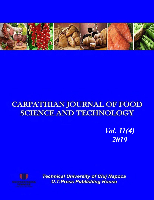
Carpathian Journal of Food Science and Technology
Pioneering Research in the Heart of Romania's Food ScienceCarpathian Journal of Food Science and Technology, a distinguished publication from the NORTH UNIV CENTER BAIA MARE, has been a pivotal platform for disseminating groundbreaking research in the field of food science since its inception in 2009. With an ISSN of 2066-6845 and an E-ISSN of 2344-5459, this Open Access journal aims to promote knowledge and innovation, offering unrestricted access to its content, thereby enhancing visibility for authors and facilitating a wider readership. Based in Romania, the journal plays a crucial role in advancing scientific inquiry within the agricultural and biological sciences, particularly focusing on contemporary food science issues. As it continues its convergence through 2024, the journal currently holds a Q4 ranking in the Food Science category, allowing it to carve out a unique niche within the academic community despite its current Scopus percentile ranking of 19th. Scholars, researchers, and students in the field will find the journal an invaluable resource for the latest advancements and discussions, making it an essential addition to their academic pursuits.

VITIS
Unveiling the Secrets of Grape Growth and QualityVITIS is a distinguished journal published by the Julius Kuhn Institute (JKI), based in Germany, dedicated to advancing the field of viticulture and enology. With a long-standing history dating back to 1981, VITIS serves as a vital platform for researchers, professionals, and students alike, focusing on critical insights and innovations related to vine genetics, cultivation, and grape quality. Although the journal operates under a traditional access model, its commitment to publishing high-quality, peer-reviewed research contributes to its relevance, as indicated by its current rankings of Q4 in Genetics and Q3 in Horticulture for 2023. Furthermore, with its Scopus rankings placing it within the agricultural and biological sciences community, VITIS plays an essential role in disseminating vital knowledge to enhance viticultural practices. Researchers and practitioners are encouraged to explore the breadth of studies published, contributing to the ongoing dialogue in horticulture and plant genetics.

Kvasny Prumysl
Unlocking the Secrets of Brewing Innovation.Kvasny Prumysl is a distinguished open-access journal dedicated to the field of brewing science and technology, published by the Research Institute Brewing & Malting. Since its inception in 2019 as an open-access platform, Kvasny Prumysl aims to provide a comprehensive forum for researchers, professionals, and students in the brewing sector to share cutting-edge research, innovative methodologies, and significant advancements in brewing science. With an ISSN of 2571-3868 and an E-ISSN of 2570-8619, this journal fosters collaboration and knowledge exchange within the brewing community, contributing to sustainable practices and excellence in brewing. Based in Prague, Czech Republic, Kvasny Prumysl seeks to elevate its global presence, ensuring that the latest findings are accessible to all through its open-access model. The journal invites submissions through a rigorous peer-review process, reinforcing its commitment to high-quality research in the brewing industry.
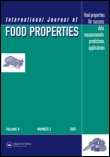
INTERNATIONAL JOURNAL OF FOOD PROPERTIES
Transforming food science through open access research.INTERNATIONAL JOURNAL OF FOOD PROPERTIES, published by TAYLOR & FRANCIS INC, is a leading platform for disseminating high-quality research in the field of food science. With an ISSN of 1094-2912 and E-ISSN of 1532-2386, this journal has been committed to open access since 2018, ensuring that groundbreaking studies are readily available to global audiences. The journal has steadily gained recognition for its contribution to the discipline, achieving a Q2 ranking in Food Science and placing in the 68th percentile among its peers according to Scopus metrics. Covering a wide array of topics related to the properties and applications of food, it serves as a valuable resource for researchers, professionals, and students alike. With coverage extending from 1998 to 2024, the journal continually seeks to advance knowledge and foster innovation within the food science community, making it a pivotal publication for anyone serious about this vital field.

MITTEILUNGEN KLOSTERNEUBURG
Nurturing Research in Horticultural ExcellenceMITTEILUNGEN KLOSTERNEUBURG is a prestigious journal published by the Höhere Bundeslehranstalt & Bundesamt für Wein- und Obstbau Klosterneuburg in Austria, focusing on the fields of horticulture and agricultural sciences. With an ISSN of 0007-5922, this journal disseminates vital research findings and advancements within the horticultural sector, emphasizing sustainable practices and innovative techniques in wine and fruit cultivation. It has been recognized for its scholarly contributions, achieving a Q3 ranking in horticulture as of 2023, positioning it among the notable resources in its field. While currently not offering open access options, MITTEILUNGEN KLOSTERNEUBURG remains an essential platform for researchers, professionals, and students alike, fostering knowledge exchange and collaborative advancements in horticultural science. The journal's dedication to supporting research from 1989 through 2024 highlights its longstanding commitment to excellence in the industry.
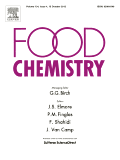
Food Chemistry
Decoding the Secrets of Food ChemistryFood Chemistry, published by Elsevier Science Ltd, is a leading international journal dedicated to the publication of high-quality research in the field of food chemistry. Established in 1976, this journal has made a significant impact in its realm, with an impressive 2023 impact factor and ranked Q1 in Analytical Chemistry, Food Science, and miscellaneous Medicine categories. It currently holds a remarkable Scopus ranking of #3 in Analytical Chemistry and #11 in Food Science, signifying its relevance and prestige among the top scholarly publications. With a wide scope that includes the chemistry of food composition, flavor, and safety, Food Chemistry serves as an essential resource for researchers, professionals, and students alike, offering insights and advancements in food analysis and technology. Access options may vary, and the journal is committed to disseminating innovative findings to foster knowledge and application in the dynamic field of food science.
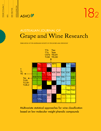
AUSTRALIAN JOURNAL OF GRAPE AND WINE RESEARCH
Pioneering Insights in Sustainable Wine PracticesAustralian Journal of Grape and Wine Research, published by Wiley, is a premier academic journal dedicated to advancing knowledge in the field of viticulture and enology. With an impressive impact factor reflecting its significance, the journal is ranked in the Q1 quartile for Horticulture, placing it among the top-tier journals in its category, and enjoys a commendable ranking of #15/115 in Scopus for Agricultural and Biological Sciences. The journal has been serving the scientific community since its inception in 1995 and continues to be a vital resource for researchers, professionals, and students engaged in grape and wine research. Accessible through subscription, it provides a platform for publishing innovative research findings and insightful reviews that foster discourse in viticulture, wine quality, and sustainability practices. For anyone passionate about the science of grapevine cultivation and wine production, the Australian Journal of Grape and Wine Research is an indispensable source of knowledge and inspiration.

Ukrainian Food Journal
Nurturing a community dedicated to food innovation.Ukrainian Food Journal is an esteemed open-access journal dedicated to advancing the field of food science and biochemistry. Established in 2012 and published by the National University of Food Technologies in Ukraine, the journal serves as a vital platform for researchers and professionals to disseminate their findings on food technology, safety, and nutritional biochemistry. With an ISSN of 2304-974X and E-ISSN 2313-5891, it offers a wealth of knowledge to its readers, promoting innovation and collaboration within the industry. While currently categorized within the Q4 quartile of biochemistry and the Q3 quartile of food science, the journal is progressively gaining recognition, reflecting a commitment to quality research in a competitive field. The journal is indexed in Scopus, ranking #271 in Food Science and #376 in Biochemistry, underscoring its relevance and contribution to agricultural and biological sciences. The Ukrainian Food Journal not only enriches the academic community with its open-access model but also aims to foster dialogue among researchers, professionals, and students dedicated to improving food systems and nutrition. It operates from its headquarters in Kyiv, offering a hub for creativity and advancement in food-related research.
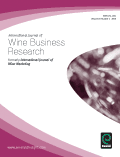
International Journal of Wine Business Research
Bridging Theory and Practice in Wine Business ResearchThe International Journal of Wine Business Research, published by Emerald Group Publishing Ltd, is a pivotal resource for scholars and practitioners in the dynamic field of wine business management. Established in 2007, this journal has emerged as a significant platform for disseminating innovative research and insights concerning the wine industry, and is indexed under Scopus with a commendable ranking of #72 out of 218 in the General Business, Management, and Accounting category, achieving a percentile ranking of 67th. With a 2023 Q2 category rank in the Business, Management and Accounting (miscellaneous) sector, the journal is recognized for its valuable contributions to understanding the complexities of wine production, marketing, and consumption. Although it is not an Open Access journal, it offers a wealth of knowledge geared toward enhancing the understanding of both the academic community and industry professionals. By bridging theory and practice, the International Journal of Wine Business Research aims to foster a comprehensive dialogue around emerging trends, sustainability issues, and the socio-economic impacts of the wine business globally.
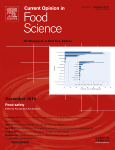
Current Opinion in Food Science
Shaping Tomorrow's Food Landscape TodayCurrent Opinion in Food Science is a premier peer-reviewed journal published by ELSEVIER SCI LTD that focuses on the latest advancements and research in the domain of food science and technology. With its ISSN 2214-7993 and E-ISSN 2214-8000, this journal serves as a critical platform for researchers and professionals to share insights and opinions on emerging trends, innovations, and challenges faced in food science. The journal enjoys an impressive impact factor and ranks in the first quartile (Q1) in both Applied Microbiology and Biotechnology and Food Science, symbolizing its influence and reputation in the field. It is strategically located in the Netherlands and conducts its academic dialogue with a broad scope that includes essential topics in food safety, nutrition, and sustainable practices. Operating from 2015 to 2024, the journal has established itself as a critical resource for the global academic community, boasting excellent Scopus rankings—#9 out of 389 in Food Science and #6 out of 127 in Applied Microbiology and Biotechnology—indicating its high relevance and impact. Readers can look forward to insightful articles and comprehensive reviews that bridge the gap between fundamental research and practical application in the ever-evolving food science landscape.